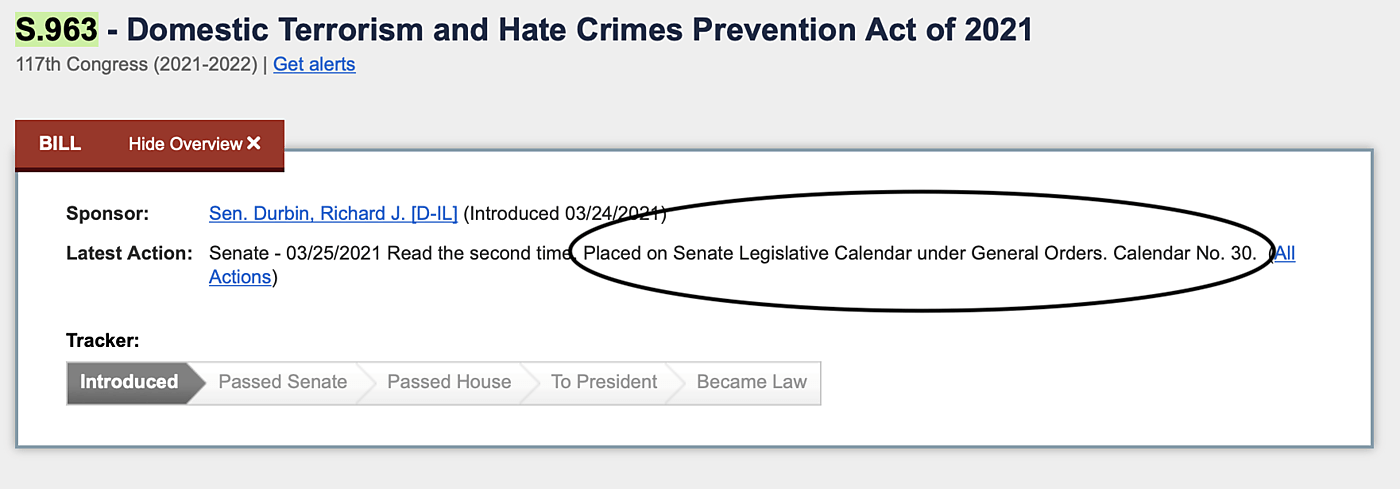Last week, I reported that Senate Judiciary Chairman Dick Durbin (D‑IL) had introduced the S. 963, the Domestic Terrorism and Hate Crimes Prevention Act of 2021–the companion bill to Rep. Brad Schneider’s (D‑IL) H.R. 350. Both bills would create new “Domestic Terrorism” bureaucracies inside the Departments of Justice and Homeland Security, and direct both departments to put special emphasis on a requirement for “anti‐terrorism” training for federal, state, tribal, and local law enforcement agencies for the purpose of “understanding, detecting, deterring, and investigating acts of domestic terrorism and White supremacist and neo‐Nazi infiltration of law enforcement and corrections agencies.”
As I’ve previously noted, both bills suffer from the same underlying flaw: the assumption that membership in a particular group–be it racial, religious, or political–has predictive value vis a vis an intent to commit a violent act. As we saw last week with the tragic, deadly incident involving Noah Green (an unemployed African American man) and U.S. Capitol Police Officer William Evans, that assumption is baseless and itself dangerous.
During more than 10 years working for then-Rep. Rush Holt (D‑NJ), our office regularly received threats from individuals; every single House and Senate office does. Most never amount to more than violent (and often obscene) rants by persons upset about a government policy they dislike or an action the government has not taken that they believe it should. Quite simply, it comes with the territory when you serve in the House or Senate–and unless a particular individual has a known, documented history of violence, predicting who will be the potential lethal threat is impossible.
Despite that reality, the Durbin bill is now officially scheduled for Senate floor consideration, as this screenshot from Congress.gov shows:
What this means is that the bill is skipping the usual Senate Judiciary Committee hearing and mark-up process and is being brought directly to the Senate floor for consideration. At this moment, the exact date for consideration is unknown, but action well before the Memorial Day break seems highly likely unless one or more Senators indicate an intention to filibuster the legislation.
The same fear-driven impulse that gave us the PATRIOT Act is at work with the push to pass the Durbin bill.
Congress enacted the PATRIOT Act just six weeks after the 9/11 attacks on the basis of claims by Executive branch officials that only sweeping new surveillance powers could stop a similar calamity from happening again. As we subsequently learned from the Congressional Joint Inquiry report in 2002, those claims were false. It was a lack of coordination, not lack of information, that allowed Al Qaeda to succeed on 9/11. The 9/11 Commission reached the same conclusion in 2004. And as we’ve already seen from just the limited investigations conducted to date regarding the January 6, 2021 attempted insurrection on Capitol Hill, that same issue–a lack of coordination, not a lack of information–was the prime reason why the House chamber and the Capitol building were overrun by a pro-Trump mob.
There is a pressing problem with Capitol Hill security that does need fixing: a streamlined chain of command that allows Washington, D.C.‘s Mayor Muriel Bowser and her successors to deploy the D.C. National Guard to assist with protecting the Capitol grounds in the event of an emergency.
Delegate Eleanor Holmes-Norton (D‑DC) and Senator Chris Van Hollen (D‑MD) have introduced the District of Columbia National Guard Home Rule Act (H.R. 657 and S. 130, respectively). That House and Senate Democratic leaders have not fast-tracked the Holmes-Norton/Van Hollen legislation is mind boggling. Had Mayor Bowser enjoyed direct control over the D.C. National Guard, those units likely could have been deployed well before the Capitol building was breached.
Rationalizing the chain of command, as well as improving pre-event coordination and response planning between the Capitol Police and the D.C. National Guard, is a far more urgent–and solvable–problem than passing “feel good” domestic terrorism legislation that will do nothing to prevent another attack on the Capitol. Whether the Senate will hit the “Pause” button on S. 963 and consider a more logical, effective response to the January 6 insurrection remains to be seen,

